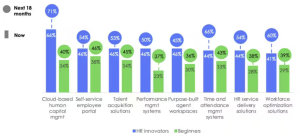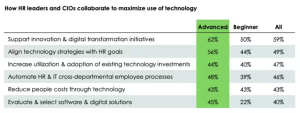Here’s a question. Where do you even start when it comes to trying to work out what’s going to be hot, not, or likely to be the centre of an HR professional’s world (from a technology point of view), in the next few years?
For most HR professionals, working out how they’re going to respond to issues this week, next week (or at a stretch, next month), is often difficult enough, but for Melanie Lougee, who has the exciting (but at the same daunting) job title of head of future HR products – the peril of getting things wrong must be great.
And she knows it.
“My role changes on an almost daily basis,” she confides cheerfully. “I’m looking at the [HR] market I’m looking at broader social and societal change; and I’m trying to work out where I think things will go, and how HR needs to change – and much of this really is new territory.”
She adds: “Things that I’ve predicted would happen in five years have actually happened in two, and so there’s now a big emphasis in how we build our products and services for a much more changeable world.”
ServiceNow – big with even bigger ambitions
For those who don’t know too much about ServiceNow, the cloud computing platform provider based in California wants to make “the world work better for everyone,” and to do this, it follows a modules-based model that allows (for example) employees become more connected, and agile – typically through work automation software.
The company has nearly 2,000 clients with an annual contract value of more than $1 million (and 14 worth more than $5 million pa). It’s also been busy on the acquisitions front. It has made 20 purchases of other tech companies since 2020 alone – principally in the realm of AI.
Leading the way is its Now Assist module (the pro vision of which was part of 11 deals it made with clients worth more than $1 million in its latest Q2 reporting), comprising a growing cross-platform family of generative AI features, which are tasks that a large language model (LLM) can perform.
These include everything from customizing workflows, to creating and summarizing responses to chatbot interactions, enabling employees to work smarter not harder, and provide what the company calls more personalized experiences for customers and staff alike.
Already Now Assist has grown to become the fastest-selling product in the company’s history, and Now Assist for HR – for example – helps HR leaders drive productivity and operational efficiency by giving employees the answers they need to questions they have quickly with little disruption to their day.
HR managers, meanwhile, can handle issues from payroll discrepancies to paperwork changes without needing to sift through loads of information by reviewing instant summaries of case topics, previous history from live chat and Virtual Agent interactions, as well as previous resolutions and actions taken. This gives HR teams the context they need to solve problems quickly and confidently.
It all sounds very tomorrow’s world though for some. Surely, is none of this potential possible without CHROs themselves having some vision of what is needed? So how does Lougee see the immediate horizon as it stands?
“Without doubt, I think we’re seeing the combination of the pace of change, plus changes to worker conditions – such as the need to re-skill,” she says. “But what I also think is more important than ever right now, is that when all is changing, we [HR] need to have even greater emphasis on the fundamentals, and keeping all relevant stakeholders aligned.”
One of the biggest shortfalls, she argues, that technology needs to deal with is recruitment.
“Most solutions have traditionally been built for attracting high numbers of candidates,” she explains. “Companies want fast and accurate recruitment, but it’s really important that the people that really matter – applicants themselves, are being properly supported too. They often get – if they’re lucky – an email reply, and then that person will never hear from that organization again.”
Lougee says more needs to be done to keep high value people better connected with the organization, and says “technology has to be the answer.”
“At ServiceNow we will, ourselves get around 900 applications for every new role we advertise,” she says. “We recognize that if you want to bring lots of people through an application process, you have to incorporate some level of automation, but it’s understanding which bits to automate that will in future be critical.”
Experience matters
Lougee says: “We believe organizations that want to do lots of recruitment still need to focus on the ‘experience’ they give people. Interventions need to be triggered when people get stuck, or when they potentially drop out [recent research finds that 78% of job seekers say they’d consider dropping out or would drop out of a complex or long hiring process].”
She adds: “HR professionals also know that they need to vet the best people, but they don’t – at the same time – want to open the floodgates.”
But is it a case that HR folk ‘know’ what they need to do, do they know ‘how’ to do it?
“I think HR professionals can be confused with technology,” she says.
“We know from our own experience that buyers of previous HR technology systems were not happy with it, and they found it wasn’t working as they thought it would. We’re increasingly hearing from CHROs that they want products they can understand.”
Lougee’s advice though is for HR folk do the techie groundwork [it will stand them in good stead, she says], so that they get themselves knowledgeable and be there in the right capacity when further technology decisions need to be made.
She says: “HR professionals can still reach a fork in the road where they have to try and work out what to do. But if CHROs can understand what’s around the corner, that’s when they can know in advance what to do, before they get to this juncture.”
Technology will rule, but humans still matter
The one thing she’s certain about – is that in recruitment certainly – candidates do not seem to care if they’re being ‘kept warm’ or engaged via artificial intelligence or actual real humans.
“Applicants just want that ongoing engagement so they know where they might stand in the future,” she says. She adds: “They just want to know they’ve been identified and kept warm.”
But in case you think technology will be at the root of everything – there is relief at least: There’s recognition from Lougee that the human element is still (and will always remain), important:
“I have mixed views still on AI ranking candidates,” for example, she says. “I see HR technology being more useful for managing the process, and doing summations – such as what skills a person or group of people have and what’s missing. It’s also useful in terms of creating a standardized way of looking at people – so everyone is treated the same. But we also need some human intelligence too.”
New research from ServiceNow and ThoughtLab reveals:
Differences in types of HR technology used now and in the near future by HR innovators vs beginners:


